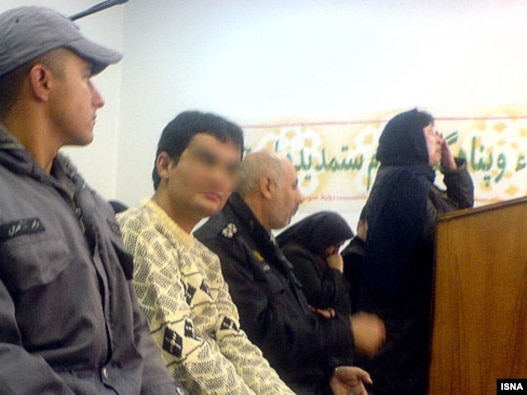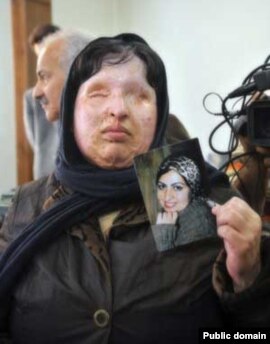Iranian woman spares attacker acid punishment
| Publisher | Radio Free Europe/Radio Liberty |
| Publication Date | 2 August 2011 |
| Cite as | Radio Free Europe/Radio Liberty, Iranian woman spares attacker acid punishment, 2 August 2011, available at: https://www.refworld.org/docid/4e4a291ec.html [accessed 30 May 2023] |
| Disclaimer | This is not a UNHCR publication. UNHCR is not responsible for, nor does it necessarily endorse, its content. Any views expressed are solely those of the author or publisher and do not necessarily reflect those of UNHCR, the United Nations or its Member States. |
Last updated (GMT/UTC): 02.08.2011 12:21
 Ameneh Bahrami Nava (right) spared her attacker, Majid Movahedi (center), from receiving acid in both eyes live on Iranian television.
Ameneh Bahrami Nava (right) spared her attacker, Majid Movahedi (center), from receiving acid in both eyes live on Iranian television.
An Iranian woman who was blinded and badly disfigured in an acid attack has stopped a retributive blinding sentence from being carried out on her attacker at the last moment.
"He was standing in the hospital operating room and the doctor was about to put acid in his eyes. It was that moment when I said, 'No, I don't want this,'" Ameneh Bahrami told RFE/RL's Radio Farda.
The sentence of "retribution in kind" called for five drops of sulfuric acid to be put in each of Majid Movahedi's eyes for the 2004 incident, when the spurned suitor poured a bucket of acid on Bahrami, ultimately leaving her blind and forcing her to undergo at least 17 operations.
But as the acid was about to be applied by a doctor in a live broadcast on Iranian state television on July 31, Bahrami spared him the punishment.
"The Koran gives you the right to retribution," Bahrami told RFE/RL. "But this very Koran also encourages you to pardon, since pardoning is one of the highest moral standards."
 Ameneh Bahrami holds up a photo of herself from before the attack.
Ameneh Bahrami holds up a photo of herself from before the attack.
Movahedi said Bahrami was "very generous," but she said her attacker "hasn't changed one bit. This person is still dangerous for society. I think a person like Majid Movahedi should be kept in prison until the last moment of his life."
Despite the protests raised against the cruel and inhumane nature of the retributive punishment by Iranian and international rights groups, Bahrami had insisted on it being carried out. Even after sparing Movahedi, she said she had no regrets in doing so.
"Other victims after me might decide for the sentence of retribution to be carried out on their attackers, some might drop it," she said. "I only wanted to get such a sentence for [the attacker]."
Bahrami also said she still wanted financial compensation from Movahedi's family. "I was told that since you're a woman, you're entitled to half of the total amount of 200 million tomans [almost $200,000], which is 100 million tomans. But Movahedi's family so far hasn't paid me even that."
She said Movahedi's father said he had a house worth 100 million tomans and that he could give her 50 million. "I don't need 50 million. The blood money is 200 million and I want all of that," she said.
Bahrami also rejected the idea that she should only get half as much compensation because she was a woman. "I am a full person and I am entitled to full amount of the blood money," she said.
Link to original story on RFE/RL website
